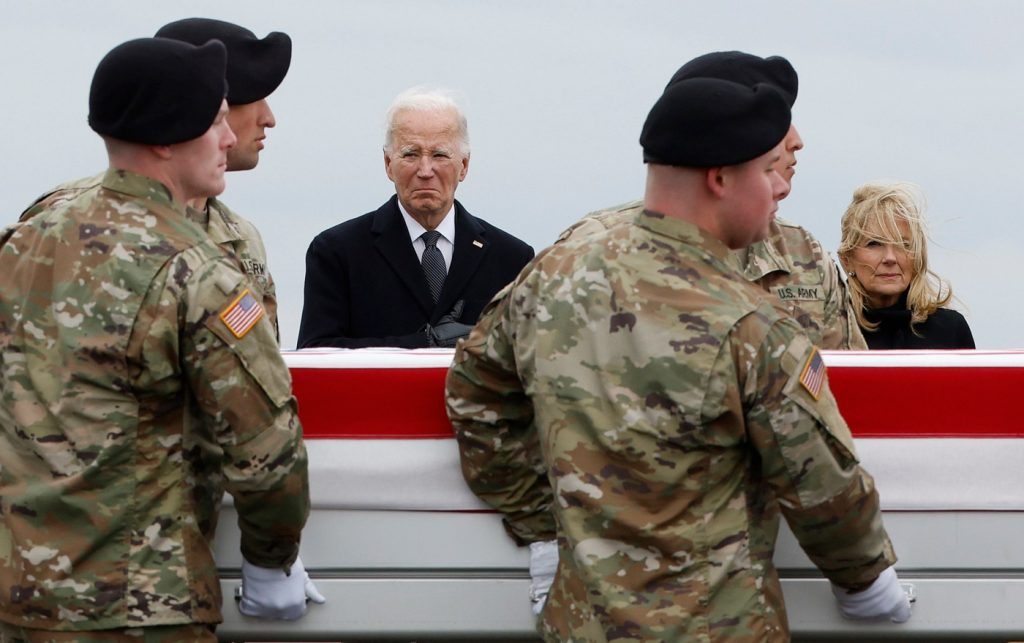By Seung Min Kim | Associated Press
DOVER AIR FORCE BASE, Del. — Standing solemnly under gray skies, President Joe Biden and first lady Jill Biden joined grieving families at Dover Air Force Base on Friday to witness the return of three American service members killed in last weekend’s drone attack in Jordan.
It’s a ritual honoring fallen troops that is one of a commander-in-chief’ s most somber duties.
With his gloved right hand over his heart, Biden looked on as the three transfer cases draped with American flags were carried the short distance from a C-5 galaxy military transport aircraft to a waiting van. The only words spoken during the 15-minute dignified transfer, aside from the commands as each case was carried, were from an Air Force chaplain’s brief prayer, asking God for “grace and mercy.”
The first transfer case held the remains of Sgt. William Jerome Rivers of Carrollton, Georgia. The movement was then repeated for Sgt. Breonna Moffett of Savannah and Sgt. Kennedy Sanders of Waycross. Once the seven-member, white-gloved carry team — composed of members of the U.S. Army, in which Rivers, Moffett and Sanders served — placed the last of the cases in the van, they offered a final salute as the remains were transported to the mortuary facility at Dover.
Before the dignified transfer, the Bidens met privately with the families at the Center for Families of the Fallen on the base. The president had also spoken with them earlier this week to offer his condolences.
“This is not the homecoming for Kennedy I dreamed about,” Sanders’ father, Shawn, wrote in a Facebook posting Friday morning. “Now, I can’t stop reliving this nightmare.”
In the post, Shawn Sanders said that “kindness and outpouring of love” was “the only thing holding me up” since his daughter’s death.
Defense Secretary Lloyd Austin, who walked with the assistance of a cane, and Gen. CQ Brown, chairman of the Joint Chiefs of Staff, were among the Defense Department and administration officials who joined the Bidens for the dignified transfer, a solemn movement conducted for U.S. service members killed in action. Georgia Sens. Jon Ossoff and Raphael Warnock, as well as Rep. Buddy Carter, who represents the home district of Moffett and Sanders, and Delaware Sens. Tom Carper and Chris Coons attended.
The soldiers were returned to American soil shortly before the U.S. military responded to the deadly drone attack that American officials say was carried out by the Islamic Resistance in Iraq, an umbrella group of Iran-backed militias that includes the group Kataib Hezbollah. The U.S. began a wave of retaliatory airstrikes Friday, targeting dozens of sites in Iraq and Syria used by Iran-backed militias.
In a statement Friday evening, Biden warned that the U.S. response will “continue at times and places of our choosing.”
“Let all those who might seek to do us harm know this: If you harm an American, we will respond,” the president said.
Rivers, Moffett and Sanders were assigned to the 926th Engineer Battalion, 926th Engineer Brigade, based at Fort Moore, Ga. Sanders and Moffett were posthumously promoted to sergeant rank.
The deaths were the first U.S. fatalities blamed on Iran-backed militia groups, who for months have been intensifying their attacks on American forces in the region following the onset of the Israel-Hamas war in October. Separately, two Navy SEALs died during a January mission to board an unflagged ship that was carrying illicit Iranian-made weapons to Yemen.
“These service members embodied the very best of our nation: Unwavering in their bravery. Unflinching in their duty. Unbending in their commitment to our country — risking their own safety for the safety of their fellow Americans, and our allies and partners with whom we stand in the fight against terrorism,” Biden said earlier this week. “It is a fight we will not cease.”
Rivers, Sanders and Moffett hailed from different corners of Georgia but were brought together in the same company of Army engineers. Sanders and Moffett, in particular, were close friends who regularly popped in on each other’s phone calls with their families back home.
Moffett had turned 23 years old just nine days before she was killed. She had joined the Army Reserves in 2019, but also worked for a home care provider to cook, clean and run errands for people with disabilities.
Sanders, 24, worked at a pharmacy while studying to become an X-ray technician and coached children’s soccer and basketball. She had volunteered for the deployment because she wanted to see different parts of the world, according to her parents.
Rivers, who was 46 years old and went by Jerome, joined the Army Reserve in New Jersey in 2011 and served a nine-month tour in Iraq in 2018.
Related Articles
Camp Lejeune water contamination linked to myriad cancers, CDC says
US blames Islamic Resistance in Iraq for Jordan drone attack
The incredible story of USS Hornet, the aircraft carrier that assisted Apollo 11
What is Tower 22, the base in Jordan where 3 US troops were killed?
Report: Drone that killed troops in Jordan mistaken for US craft
The dignified transfer, in recent years, has become relatively uncommon as the U.S. withdrew from conflicts abroad, most notably the war in Afghanistan where U.S. involvement lasted two decades.
According to the Defense Department, no other service members have been killed as a result of hostile action since 2021. Thirteen service members were killed during the fall of Kabul in Afghanistan, when a suicide bomber at the airport’s Abbey Gate killed 11 Marines, one sailor and one soldier. Nine service members were killed as a result of hostile action in 2020.
Friday is the second dignified transfer Biden attended as president. In August 2021, he took part in the ritual for the 13 service members killed during the suicide bombing in Kabul. As vice president, Biden in 2016 attended a dignified transfer for two U.S. soldiers killed in a suicide blast at Bagram Airfield. He also attended one as a senator in 2008 after a family requested his presence and the Pentagon gave him permission to do so.
The U.S. government said this week that the Iran-backed militants had planned, resourced and facilitated the overnight drone attack. More than 40 troops were also injured in the assault at Tower 22, a secretive U.S. military desert outpost whose location allows U.S. forces to infiltrate and quietly leave Syria.
Associated Press writers Russ Bynum in Savannah, Georgia, and Aamer Madhani and Tara Copp in Washington contributed to this report.


